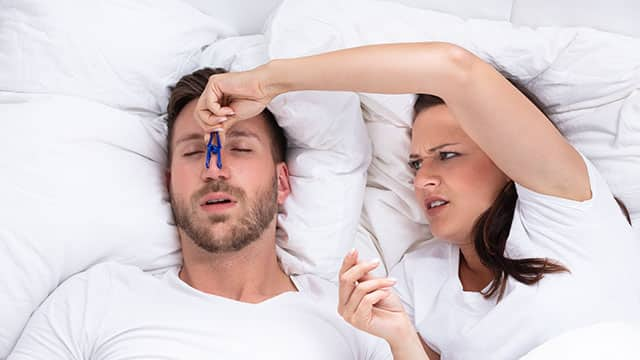But what causes snoring, and is it something you can fix? When you are asleep, your tongue, soft palate, and throat muscles relax. Sometimes these soft tissues can block the airway, causing a forceful, vibrating sound when air flows through. Many snoring aids are available over-the-counter, yet choosing the right one can be difficult and leave you wondering if it will work. Here is a list of some snoring aid options and how they can help you.
Snoring Aids
The causes of snoring vary from chronic nasal congestion to habits such as smoking and drinking alcohol before bedtime, which can relax your throat muscles and block the airway. But it can also be a symptom of a more serious health condition, like Obstructive Sleep Apnea. This is why different snoring aids are made to help alleviate specific causes. Before you start shopping for any snoring aids, you should talk to your doctor first. They can identify the cause of snoring and recommend a treatment option.
Nasal Strips:
These strips have an adhesive side that you place on the bridge of your nose. They are designed to gently open the nasal passage and help increase airflow while you're sleeping.
Works For: Snoring caused by nasal congestion, common cold, or a deviated septum.
Nasal Dilator:
Similar to nasal strips, nasal dilators can reduce airflow blockage by widening the nasal passage. Dilators can be safely placed across the nostrils while you're asleep.
Works For: Snoring caused by nasal congestion, common cold, or a deviated septum.
Snoring Pillows:
Do you sleep on your back? Well, your sleeping position could be the cause of your snoring. When you sleep on your back, your tongue slips back into your throat, narrowing the airway. Anti-snore pillows are specially designed to support your neck and head while you sleep. These pillows help you avoid sleeping on your back and improve your sleeping posture.
Works For: Snoring caused by sleeping position.
Oral Appliances:
If your snoring results from Obstructive Sleep Apnea (OSA), a chronic sleeping disorder that disrupts breathing patterns, an oral appliance can help. Oral appliances keep your air passage open while your sleeping by positioning your jaw, tongue, and soft palate. Your dentist will custom-make an appliance that will fit your mouth comfortably. Once you have received your perfect fit, you can place the appliance in your mouth at bedtime.
Works For: People diagnosed with Obstructive Sleep Apnea.
CPAP Devices:
Your doctor may prescribe continuous positive airflow pressure (CPAP) therapy if you experience moderate to severe sleep apnea. The device has a mask that will go over the mouth and nose or just a nose piece inserted into the nostrils before you sleep. The machine's air pressure will open your airway passages helping to alleviate obstructive sleep apnea and snoring.
Works For: People diagnosed with Obstructive Sleep Apnea.
Nobody wants to admit that they snore, but knowing for sure is important. With your doctor's help, you can identify the cause and find a great solution that's best suited for you. Remember to consult with them first before reaching for any over-the-counter snoring aids. Try nasal strips or dilators if your snoring results from a congested nose. Anti-snoring pillows are a great way to get you sleeping in the right position. If your doctor finds that your snoring is a symptom of OSA, they may recommend an oral appliance or CPAP device to help you breathe better at night. Whichever option you choose, you will be well on your way to getting some well-deserved beauty sleep.
Oral Care Center articles are reviewed by an oral health medical professional. This information is for educational purposes only. This content is not intended to be a substitute for professional medical advice, diagnosis or treatment. Always seek the advice of your dentist, physician or other qualified healthcare provider.
ORAL HEALTH QUIZ
What's behind your smile?
Take our Oral Health assessment to get the most from your oral care routine
ORAL HEALTH QUIZ
What's behind your smile?
Take our Oral Health assessment to get the most from your oral care routine















